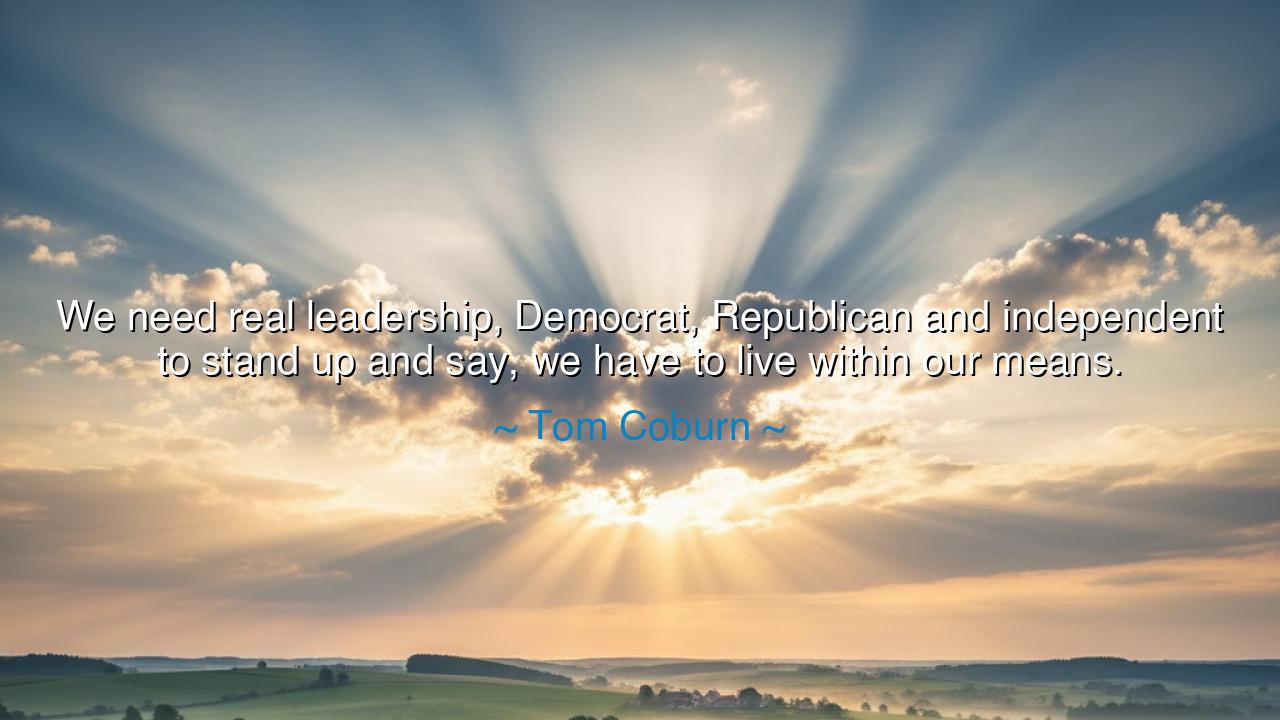
We need real leadership, Democrat, Republican and independent to
We need real leadership, Democrat, Republican and independent to stand up and say, we have to live within our means.






The words of Tom Coburn—“We need real leadership, Democrat, Republican and independent to stand up and say, we have to live within our means”—echo like a call to virtue in an age of indulgence. They are not merely about budgets or politics; they are about the discipline of nations and the character of people. For Coburn, who spoke as both a physician and a statesman, the health of a society is much like the health of a body: it cannot thrive on excess, nor can it survive by feeding upon its future. His words summon not just politicians, but citizens, to remember an ancient truth—prosperity without restraint leads to ruin, and freedom without responsibility becomes decay.
When Coburn called for “real leadership”, he spoke not of party allegiance but of moral courage. The leader he envisioned was not one who flatters the people, but one who dares to tell them what they must hear: that the path of restraint, though hard, is the path of endurance. True leadership, as the ancients knew, is not measured by applause but by integrity. In Athens, Pericles led his people through the Peloponnesian War not by promising ease, but by reminding them that greatness demands sacrifice. So too did Abraham Lincoln hold firm in the face of division, reminding America that unity could not be purchased cheaply. In every age, the voice of wisdom must rise against the chorus of comfort—and that is the essence of Coburn’s lament.
To “live within our means” is both an economic and spiritual commandment. It speaks to the humility of knowing limits and the wisdom of balance. A nation that spends without thought, like a man who eats without restraint, eventually weakens itself. The ancients called this hubris—the pride that defies natural boundaries, believing that resources are endless and consequences distant. But history teaches otherwise. The fall of Rome began not with a single defeat, but with centuries of extravagance—lavish feasts, endless wars, and debts that even the empire’s wealth could not pay. When moderation dies, empires follow.
Coburn’s warning, therefore, was not merely about money, but about character. For a people’s virtue is reflected in how they manage their plenty. To live beyond one’s means is to surrender to illusion—to believe that comfort can replace effort, that entitlement can replace gratitude. But a strong nation, like a strong soul, must be anchored in responsibility. This is why Coburn called upon leaders of all parties—Democrat, Republican, and Independent—to transcend division and embrace truth. For truth, unlike politics, cannot be negotiated; it demands courage, unity, and sacrifice.
Consider the example of George Washington, who, at the end of his presidency, could have remained in power but instead chose to step down. He lived “within his means” not only materially, but morally—knowing that even virtue must be bound by self-restraint. His example taught that the greatness of leadership lies not in accumulation, but in discipline. Coburn’s words carry that same spirit: that a republic survives not through abundance, but through self-control; not through power, but through principle.
In a deeper sense, Coburn’s appeal is also a mirror for the individual. Each person, in their own life, must learn to govern their desires as a ruler governs a nation. To spend beyond one’s means, to chase every indulgence, is to lose the strength of will that gives life meaning. Just as a family cannot prosper by debt, a soul cannot flourish by indulgence. To live within one’s means is not an act of deprivation—it is an act of wisdom, of knowing that true wealth is contentment, and true freedom is restraint.
The lesson, then, is eternal: whether for a nation or a person, sustainability is born of discipline. Leaders must have the courage to say “enough,” even when it is unpopular. Citizens must learn to distinguish need from desire, and future from fleeting pleasure. The path to renewal begins not in abundance, but in accountability.
And so, let Coburn’s words be remembered as both prophecy and promise. If a people can rediscover the virtue of moderation, they will endure every trial. If their leaders can rise above politics and speak the hard truths, the republic will be strengthened, not weakened, by its honesty. For the measure of civilization has never been how much it consumes, but how wisely it lives. To live within our means is to live within truth—and truth, once embraced, is the foundation of all freedom.






AAdministratorAdministrator
Welcome, honored guests. Please leave a comment, we will respond soon